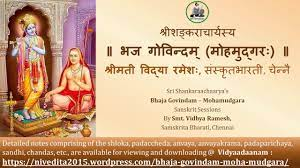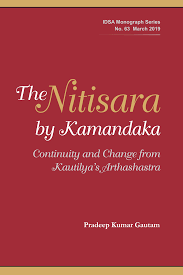नीतिसारः Niti Sara is one such work
which shows light on many important aspects of life which we have to understand
and practice. Written in simple style, this work is a great treasure
especially for children who are to be molded from the young age.
Even adults can cherish the essence
of this work and use it as a tool for their personal
transformation. Such is the greatness of this work नीतिसारः Niti
Sara.
प्रणम्य सर्वलोकेशं देवदेवेश्वरं हरिम् । नीतिसारं प्रवक्ष्यामि
सर्वशास्त्रसमाहृतम् ॥ 1
I
shall expound Nitisara (essence of maxims
on right conduct) compiled from all scriptures,
bowing down to Vishnu, the lord of the universe.
Listen
to the complete essence of dharma (right action) and contemplate on it. “Do not
do unto others what one would not like others to do unto oneself”.
Do
not act without examining the situation carefully; one ought to act only after
scrutinizing the situation carefully. Otherwise, one will have to grieve like
thebrahmani (Brahman woman) who killed the mongoose.
Man
is bound to experience the fruits of his good and bad actions. The karma does
not diminish even after billions of days of Brahma2 unless one experiences
fruits of karma.
One
cannot earn or retain wealth without undergoing suffering. There is suffering
in earning wealth as well as in spending it. Is not wealth the home of
suffering?
आचार्यात् पादमादत्ते पादं शिष्यः स्वमेधया ।
A
student acquires quarter of knowledge from the teacher, a quarter from self study, a quarter from class mates and the
final quarter in course of time.
A
scorpion has poison in its tail. A bee has poison in its head. Takshaka (a
snake mention in Puranas) has poison in its teeth. An evil person has poison in
all his limbs.
पक्षीणां बलमाकाशं मत्स्यानामुदकं बलम् । दुर्बलस्य बलं राजा बालानां रोदनं बलम् ॥8
Sky
is the strength of birds, water the strength of fish; king the strength of the
weak and wailing the strength of babies.
Helping
an evil person will cause harm to one even as feeding milk to a snake will only increase its poison.
Win
the whole world by truth, sorrow by charity, elders by service and the enemies by archery.
Jati
(jasmine) among flowers, Vishnu among
men, Rambha among women, Kanchi among cities,
Ganges among rivers, Rama among kings, Magha among poetic compositions and Kalidasa among poets excel the others.
He
who gives birth, takes one to the Guru, imparts knowledge, gives food and
protects one from fear – these five are equal to father.
The wives of teacher, king and elder brother, the mother-in-law and the
mother who gave birth – these five are mothers.
Keep
a distance of 5 hasta3 (cubits) from a vehicle, ten cubits
from a horse and 1000 cubits from an elephant. Keep as much away as possible from an evil person.
The
snake and the wicked person are both dangerous. The poison of a snake can be
neutralized by mantra or medicine while there is no mantra or medicine that can
remove the poison of a wicked person. (Hasta is a unit equal to cubit, a measure of length - equal to 24 angulas or about 18 inches, being the distance between the elbow and the tip of
the middle finger.)
Longevity,
deeds, prosperity, knowledge and death of a person are decided even while he is
in the mother‟s womb.
Seeing the elephants, snakes and birds in bondage, the eclipse of the sun and the moon
and the poverty of the wise men I conclude that destiny is inevitable.
Those who are uneducated do not shine even if they are endowed with beauty and youth and are
born in renowned families just like kimsuka4 flowers which are
beautiful but odourless.
Clothing is the prime requisite for decorations, ghee is the foremost
requisite for food, virtue is the foremost requisite for women and knowledge is
the chief requisite of scholars.
One’s wealth and properties remain at one’s home, sons and
relatives take leave at cremation ground. It is one’s good and
evil actions that accompany oneself after death.
Righteousness prevails and not unrighteousness. Truth prevails and
not untruth. Patience prevails and not anger. Gods prevail and not demons.
Stocking grains, taking care of calves, doing cultivation oneself, serving one’s elders, these five habits
support a family’s growth.
Treat the child like a prince till the age of five, like a servant
till the age of fifteen. When the son reaches
the age of sixteen, treat him like a friend.
Save wealth for difficult times; how can the wealthy have
difficulties? If one squanders wealth, one will eventually lose all the
accumulated wealth.
One’s
physical body, wealth and other resources are transitory. Death is
always at hand. Knowing this, a wise man should strive to do righteous actions.
One who is beneficial is a kinsman though he
is a stranger. One who is harmful is an enemy though he is a kinsman. When one
is seriously sick, herbs from distant forest are used as medicine.
The knowledge confined to books, wealth that is in the custody of others and a son who
has gone to foreign countries are useful in name only.
Company of wife is as good as the treatment given by ten physicians.
Sun is ten times beneficial than the care given by wife. Mother is ten times
beneficial compared to the Sun. Yellow Myrobalan is ten times beneficial than
the mother.
Even
a virtuous person perishes due to association with the wicked just as the swans that gave refuge to the crows
perished because of the evil deeds committed by the crows.
The characteristics of the wicked persons and
phlegm are surprisingly similar. Both of these are agitated by sweetness and
are pacified by bitter-ness. (Phlegm is
agitated by sweet food and is pacified by bitter food while the wicked person is agitated by sweet
words
and is pacified by bitter words).
Enmity comes to an end by death. Youth ends with pregnancy. Anger comes to an end
by bowing down. Pride comes to an end by begging before others.







